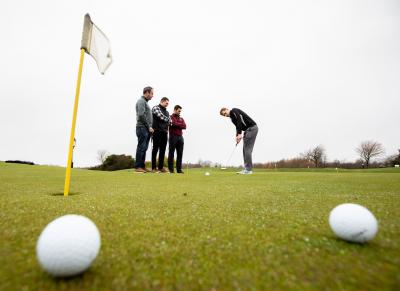Science backs-up Arnold Palmer’s golf theory

Credit: Photo by Alan Place
Researchers from Lero, the Science Foundation Ireland Research Centre for Software, hosted at University of Limerick (UL), are lending support to Arnold Palmer’s famous assertion that golf is predominantly played in “the six inches between the ears”.
According to research by Lero and UL, kinaesthetic ability, which is an individual’s ability to feel an action without actually performing it, may improve their golf game. Niall Ramsbottom, a researcher at Lero and UL, explained that recent research carried out by the team indicates that with mental practice, golfers can improve their putting.
“Our results indicate that a form of mental practice, i.e. the combination of action observation and motor imagery, may enhance the golf putting ability of experienced golfers,” he said, “and that could well mean a reduction in a golfer’s handicap”.
The research was carried out at the Physical Education and Sports Sciences Department at University of Limerick, in conjunction with Lero. The findings for the work carried out by Mr Ramsbottom and his fellow researchers, Eoghan McNeill, Dr Adam Toth and Dr Mark Campbell, show that golfers who already had a good ‘feel” for putting, may benefit the most from this mental practice.
“We found, kinaesthetic imagery ability – an individual’s ability to imagine the feel of an action without actually performing it – may have an important role in determining the effectiveness of the exercise on putting performance. Putting is a feel-based motor skill and our research suggests that those with good kinaesthetic imagery ability may perform better following this mental practice technique,” explained Mr Ramsbottom.
“The findings suggest that simply viewing a video of another performing an action may bolster one’s ability to imagine and subsequently perform that action,” he said.
Putting ability is crucial in golf as approximately 40% of golf strokes are taken with the putter.
“Furthermore, golf putting ability was found to be one of the most important skills in determining earnings on the Professional Golf Association (PGA) Tour,” the report, published in Psychology of Sport and Exercise, states, citing previously conducted research.
In undertaking the research, 44 right-handed, skilled male golfers from the Limerick area were recruited. Each of the participants was required to hold a current Golfing Union of Ireland handicap, and could not have participated on any such research previously. In a laboratory environment, the golfers completed 40 putts with instructions to ‘make the ball stop as close to the target as possible’. A three-dimensional ultrasound camera was used to record the putting and statistical analysis was conducted, using specialised software.
“A subset of golfers looked at an action observation video which consisted of an expert golfer performing the putting task in the same lab environment. They did so while listening to a motor imagery script consisting of short sentences describing key visual and kinaesthetic feelings associated with performing the putting the task. Having completed these simple exercises, the golfers who were found to have better kinaesthetic imagery (KI) ability benefited more from the mental practice intervention than those with poorer KI ability,” explained Mr Ramsbottom.
###
Lero opened Ireland’s first esports research lab in September 2019, combining health science and computing research.
About Lero
Lero, the Science Foundation Ireland Research Centre for Software, brings together expert software teams from universities and institutes of technology across Ireland in a co-ordinated centre of research excellence with a strong industry focus. Lero’s research spans a wide range of application domains from driverless cars to artificial intelligence, cybersecurity, esports, fintech, govtech, smart communities, agtech and healthtech.
Hosted by University of Limerick, Lero’s academic partners include Dublin City University, Trinity College Dublin, University College Dublin, Maynooth University, National University of Ireland Galway, University College Cork, Institute of Technology Tralee, Dundalk Institute of Technology and Cork Institute of Technology.
Lero’s overall vision is to establish Ireland as a location synonymous with high-quality software research and development, to the extent that ‘Irish software’ can enter the lexicon in the same way as ‘German automotive’ or ‘Scandinavian design’.
As the world’s second largest software exporter, Ireland is recognised internationally as a leading location for companies in the software sector and Lero is a key pillar of that. Fifteen out of the top 20 global technology firms have strategic operations in Ireland. Since it was founded in 2005, Lero has become one of the best-known, and most highly regarded, software research centres in the world.
- Lero is ranked joint number one among software research centres worldwide for citations.
- Lero partners with three of the top 10 technology companies in the world.
- Lero researchers engage directly with more than 10,000 members of the public every year.
- Lero has introduced software and computer science programmes in the Irish education system from primary to graduate level.
Social media:
Twitter: @LeroNews
Twitter: @UL
LinkedIn: Lero-Centre
LinkedIn: University-of-Limerick
About the research:
Full research paper is available here: https:/
DOI: 10.1016/j.psychsport.2019.101610
This work was supported, in part, by Science Foundation Ireland grant 13/RC/2094 and co-funded under the European Regional Development Fund through the Southern & Eastern Regional Operational Programme to Lero – the Irish Software Research Centre (http://www.
Media Contact
Nicola Corless
[email protected]
353-861-414-640
Related Journal Article
http://dx.




